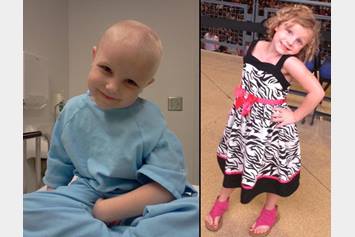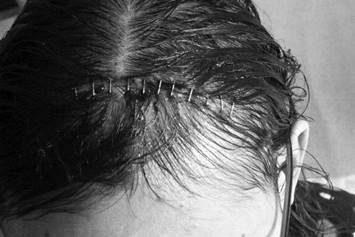Leukemia
Although childhood cancer is rare, leukemia is the most common form.
What Is Leukemia (ALL and AML)?
Leukemia is cancer of the tissues of the body which make the blood cells and the bone marrow. When leukemia strikes, the body makes an abundance of abnormal white cells that do not perform their proper functions. They invade the marrow and crowd out the normal healthy blood cells, making the patient susceptible to infection and bruising.
There are two main types of childhood leukemia:
- Acute lymphocytic leukemia (ALL)
- Acute myelocytic leukemia (AML)
ALL accounts for 80 percent of all leukemia in children and AML accounts for 20 percent.
For more detailed information regarding leukemia, including signs and symptoms, read our Helping Hand™.
As a national leader in outcomes and quality, we understand cancer.
What Causes Leukemia?
The cause of leukemia is not known, but we do know that it is not contagious and it is not thought to be hereditary. Some research suggests that things in the environment may play a role in developing this type of cancer.
How Is Leukemia Treated?
The types of treatment used most often to treat childhood cancer are:
- Surgery
- Chemotherapy
- Radiation therapy
- Bone marrow transplantation
The goal of treatment is to destroy the cancer cells.
Your child may have one kind of treatment or a combination of treatments and may have to have a variety of tests and procedures during treatment. Their treatment plan depends on:
- The type of cancer
- Stage of disease
- Many other factors.
Before treatment starts, your doctor will discuss the treatment plan with you including expected benefits, risks and side effects. Nationwide Children's also participates in clinical trials.
The Blood and Cancer Center at Nationwide Children's Hospital is one of the largest pediatric cancer centers in the country and a member of the Children’s Oncology Group, which ensures that your child will get the highest quality care available anywhere in the country.
- Surgery is a local therapy that involves the surgical removal of all or part of the cancer. Often, surgery is used with chemotherapy and/or radiation therapy. The type of operation will depend on the location of the main tumor, its size and other individual factors.
- Chemotherapy is the treatment of cancer with “anti-cancer” drugs to destroy cancer cells. Chemotherapy drugs slow or stop cancer cells from growing and making more abnormal cells. While these drugs may affect normal healthy cells, these can repair and return to normal.
- Radiation Therapy is the treatment of cancer and other diseases with high-energy rays to damage or destroy cancer cells. Most radiotherapy is delivered from the outside of the body in the form of high energy X-rays. Radiation therapy can damage normal cells as well as cancer cells. When this happens, side effects occur. If your child is receiving radiation therapy, you will receive more information from your doctors and nurses.
- A Bone Marrow Transplant (BMT) replaces diseased bone marrow with healthy bone marrow. Bone marrow is the soft material inside the bones of the body that makes blood cells. In an autologous bone marrow transplant, the patient’s own bone marrow is treated and reinfused. In an allogenic bone marrow transplant, healthy marrow comes from a donor.
What Tests or Procedures May be Performed During Treatment?
Depending on your child’s diagnosis, he or she may need to have tests or procedures done periodically through their treatment. These may be done to see how your child is responding to treatment or to keep a watch on side effects.
Click on the links below to learn more about specific tests and procedures:
Clinical Trials at Nationwide Children's Hospital
You or your child may be asked to participate in a clinical trial. Your participation in this research study is voluntary.
A clinical trial is a research study in which physicians find ways to improve cancer treatment. The goals of these studies are to answer scientific questions about preventing, diagnosing and treating cancer.
A clinical trial for cancer treatment occurs in three phases.
-
Phase I – This is a first study done on a drug to test its safeness, to determine the right dose, and to determine when and how to give the drug. These studies usually are limited to a small number of patients.
-
Phase II – As in Phase I, this phase also tests the safety of a drug, but the trial also tests how well the drug works to treat different types of cancers.
-
Phase III – This phase of a clinical trial studies various drugs, usually in combination, against standard therapy. These studies enroll large numbers of patients at many different cancer centers.
Cancer treatment has improved greatly over the past several decades due to the use of clinical trials. Children’s Hospital does Phase I, Phase II and Phase III clinical trials. If you are asked to participate in a clinical trial, the physician will review the study and consent form with you and answer your questions. You will receive a pamphlet with more detailed information about clinical trials to help you make a decision.



